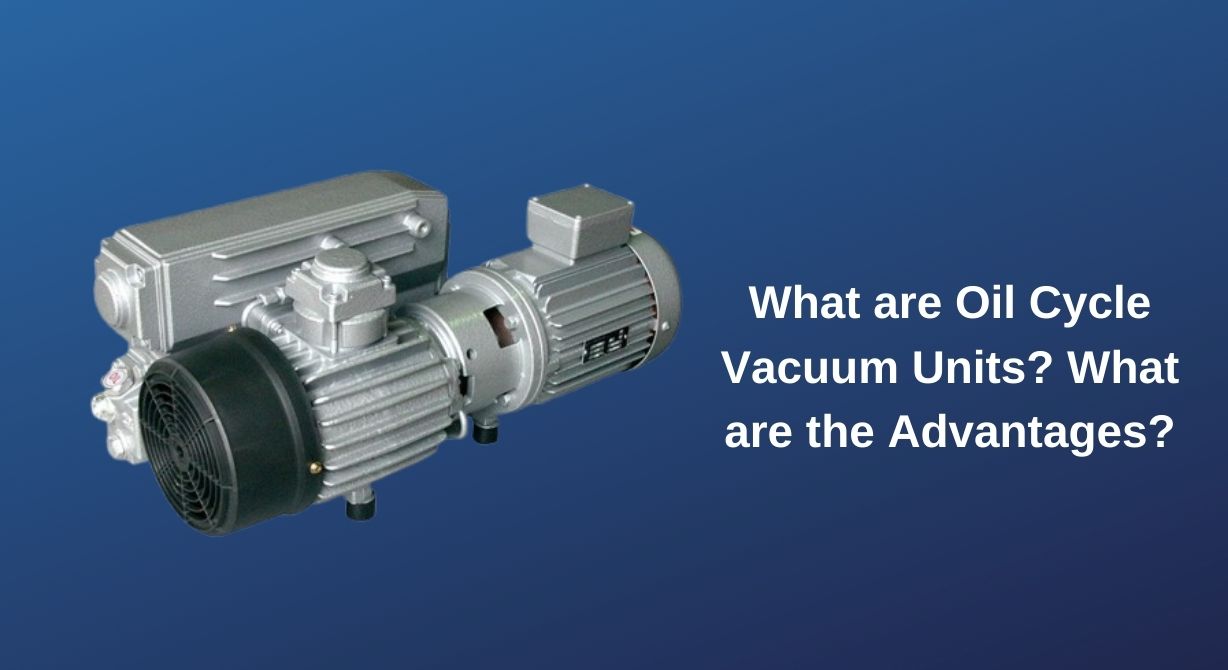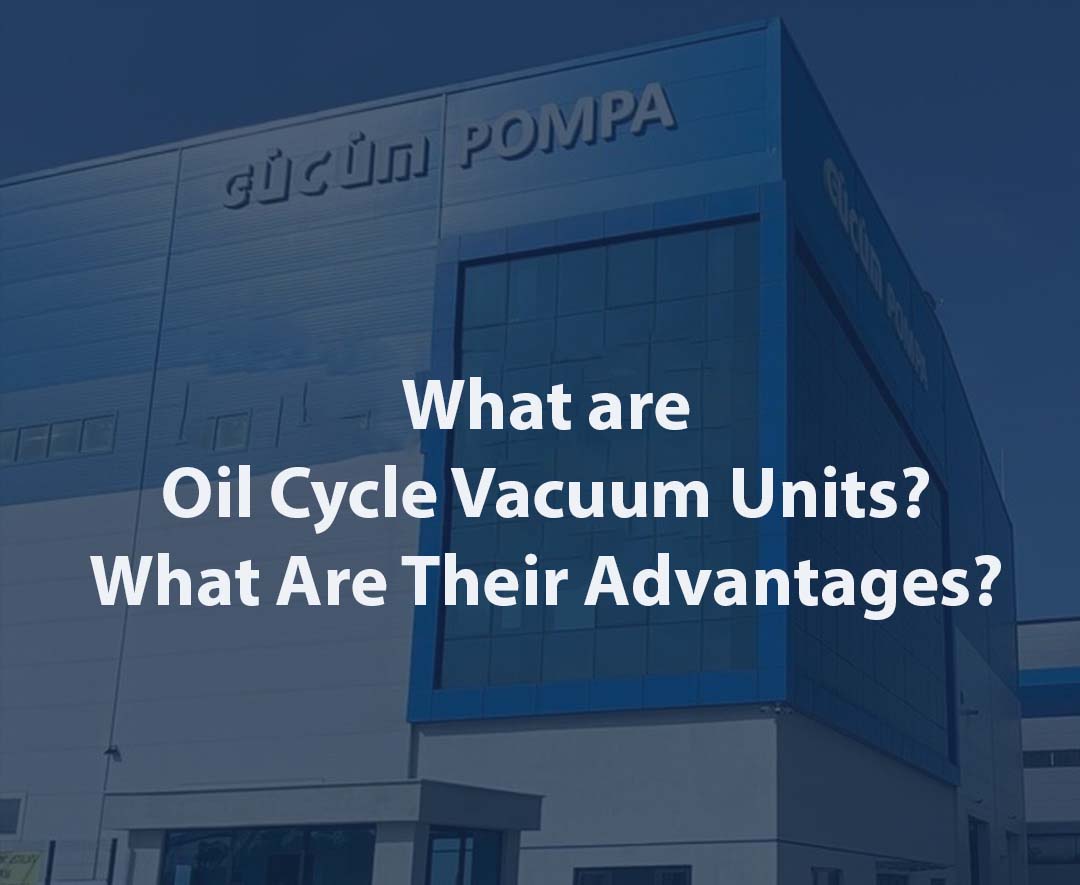What are Oil Cycle Vacuum Units? What are the Advantages?
Contents
- What are Oil Cycle Vacuum Units?
- Working Principle
- Areas of Use
- Advantages
- Maintenance and Durability
- Comparison of Oil Cycle Vacuum Units and Dry Vacuum Units
- Criteria for Choosing the Right Vacuum Unit
- Energy Efficiency and Environmental Impacts
- Oil Usage and Filtration Processes
- Future in Industry
What are Oil Cycle Vacuum Units?
Vacuum technology is of great importance for systems that need to operate precisely and efficiently in many industries. Oil cycle vacuum units provide a more stable and long-lasting vacuum process by lubricating the mechanical components of the vacuum pump with oil during operation. These systems are especially preferred to reach high vacuum levels and offer higher performance thanks to the extra sealing provided by the oil. Reliable vacuum sources are required in industrial processes, and oil cycle vacuum units are one of the most common solutions that meet this need. These units provide high efficiency in both small-scale production processes and large industrial applications. Especially in areas requiring automation and precision, oil cycle vacuum systems attract attention with their robust performance. Maintaining a stable vacuum is critical for production processes to proceed safely and smoothly. The advantages offered by lubricated systems make significant contributions to the efficient operation of the industry. In the evolution of vacuum technology, oil cycle systems are one of the most reliable options serving this purpose.

Working Principle
Oil cycle vacuum units work through mechanical pumps that create low pressure by evacuating air and gases from the vacuum chamber. The oil in the vacuum pump reduces the friction of moving parts, minimizes wear and ensures that the pump operates more efficiently for a longer time. The oil is used in a cycle and cleaned continuously, thus maintaining the quality of the oil and ensuring efficient operation of the system. Oil-filled systems provide vacuum by pushing the gases that will create pressure out of the internal environment, together with the oil rotating in the pump. The oil inside the system functions as both sealing and cooling. Thus, oil cycle vacuum units reliably provide the low pressure required to achieve high vacuum levels. This process increases the efficiency of lubricated systems and ensures long-term, uninterrupted operation. The operating principle of oil cycle vacuum units makes them the preferred systems in industrial production lines.
Areas of Use
Oil cycle vacuum units have wide usage in many industries. It is widely used in vacuum molding processes in the plastic and rubber industry, in packaging processes in the food industry, and in sterilization and analysis in medical and laboratory fields. It is also among the preferred systems in metal processing, electronics production and chemical industry. Oil cycle vacuum systems offer great advantages, especially in sensitive production processes, processes requiring high vacuum and environments where stable pressure must be maintained. These units are also used effectively in automatic systems and increase the efficiency of various industrial production lines. It is a common practice to use such vacuum units to ensure continuity in production processes. With developing technologies, the usage areas of oil cycle vacuum systems are expanding day by day.
Advantages
One of the biggest advantages of oil cycle vacuum units is their ability to reach high vacuum levels. Oil reduces friction within the pump, ensuring longer life for components. These systems are particularly suitable for sensitive operations, offering a more stable operating environment than dry vacuum pumps. Thanks to continuous lubrication, wear and mechanical failures are prevented and maintenance costs are reduced. Thanks to its high temperature resistance and long-term uninterrupted operation, it can be used safely in industrial environments. The robust performance of oil cycle vacuum units allows industrial processes to run uninterrupted and efficiently. These units optimize business processes with less maintenance required and less failure rate. The durability of oil cycle systems reduces production costs and provides economic benefits to businesses in the long term. These features make them indispensable solutions for the industry.
Maintenance and Durability
Regular maintenance is required for long-term and efficient operation of oil cycle vacuum units. Changing the oil at regular intervals, cleaning the filtration systems and general checks of the pump increase the performance of the system. The use of quality oil and correct filtration methods increases the durability of the system and reduces long-term costs. Not neglecting periodic maintenance will prolong the life of the vacuum unit and prevent possible malfunctions. In this way, businesses can increase their productivity by minimizing unplanned downtime. Oil cycle vacuum units provide long-term use under appropriate maintenance conditions and operate with maximum efficiency. Maintenance processes maximize the performance of the units while also increasing energy efficiency. Therefore, the life of vacuum units can be extended by regular maintenance, providing businesses with savings in the long run.
Comparison of Oil Cycle Vacuum Units and Dry Vacuum Units
Oil cycle vacuum units offer higher performance compared to dry vacuum systems. Dry vacuum units may be environmentally advantageous as they do not require oil, but oil cycle systems are superior in achieving lower pressure and more stable operation. Which system to choose should be determined according to the area of use and need. Oil cycle vacuum systems offer a more reliable solution, especially in industrial applications requiring high vacuum and low pressure. Dry vacuum units, on the other hand, attract attention with their need for less maintenance and being environmentally friendly, but they cannot reach the high efficiency offered by oiled systems. Oil cycle units are a more reliable and efficient solution, especially preferred in critical applications. Therefore, the right choice should be made by considering the advantages and disadvantages of both systems.
Criteria for Choosing the Right Vacuum Unit
When choosing a vacuum unit, factors such as the required vacuum level, the process requirements of the business and energy consumption should be taken into account. Maintenance costs and durability should also be considered. Choosing a unit that will provide the most appropriate balance of cost and performance in the long term provides a great advantage for businesses. Determining the vacuum unit most suitable for the production processes of the business is of great importance in terms of both energy saving and efficiency. When choosing a vacuum unit, lifespan and maintenance requirements, as well as the capacity of the system, should be taken into consideration. When the right unit is selected according to these criteria, businesses achieve high efficiency and reduce their costs. The right choice in vacuum unit selection will provide great advantages in the long term.
Energy Efficiency and Environmental Impacts
Oil cycle vacuum units can be advantageous in terms of energy efficiency when used correctly. However, the oil used must be changed regularly and disposed of in a way that does not harm the environment. For this reason, modern vacuum systems are developed with technologies that consume less energy and offer more environmentally friendly filtering methods. The energy efficiency of vacuum units is an important factor to achieve sustainable production goals. Oil cycle systems minimize environmental impacts by providing long-term efficiency with low energy consumption. This feature provides great benefit in reducing the environmental impact of industrial processes. With the development of technology, vacuum systems that consume lower energy are becoming more common. These systems pave the way for environmentally friendly production processes.
Oil Usage and Filtration Processes
In oil cycle vacuum units, oil usage plays an important role. Oil provides both lubrication and helps cool the pump. Therefore, the quality of the oil has a direct impact on the efficiency of the vacuum system. Proper functioning of filtration processes increases the performance of the system and ensures its trouble-free operation for longer. Therefore, it is important to regularly clean and change the oil. Regular maintenance of filtration systems helps maintain the quality of the oil and allows the system to operate more efficiently. Correct filtration process ensures healthy operation and long life of the vacuum unit.
Future in Industry
The future of oil cycle vacuum units will be shaped by constantly developing technology. New generation vacuum systems promise lower energy consumption and higher performance. With developing automation systems and digitalization, the efficiency of vacuum units will increase further. These systems are expected to become more environmentally friendly and require less maintenance. With the integration of digital monitoring systems, the performance of vacuum systems can be monitored instantly and faster interventions can be made. With these innovations, the role of oil cycle vacuum units in industrial processes is becoming more important day by day.
